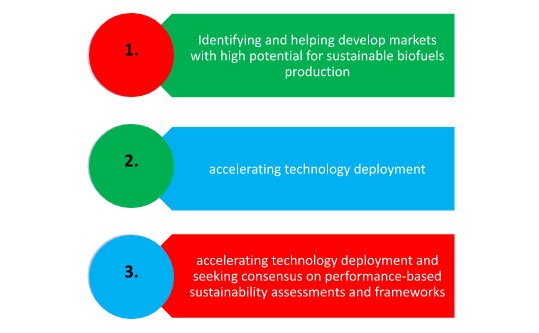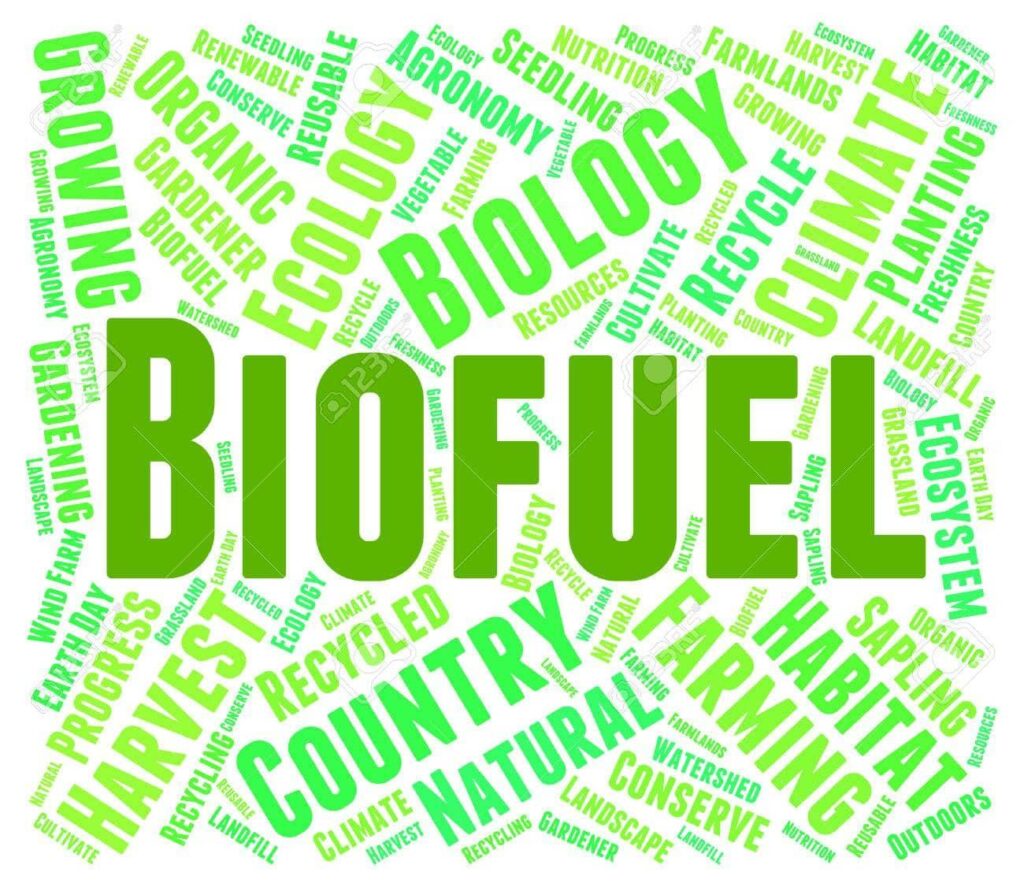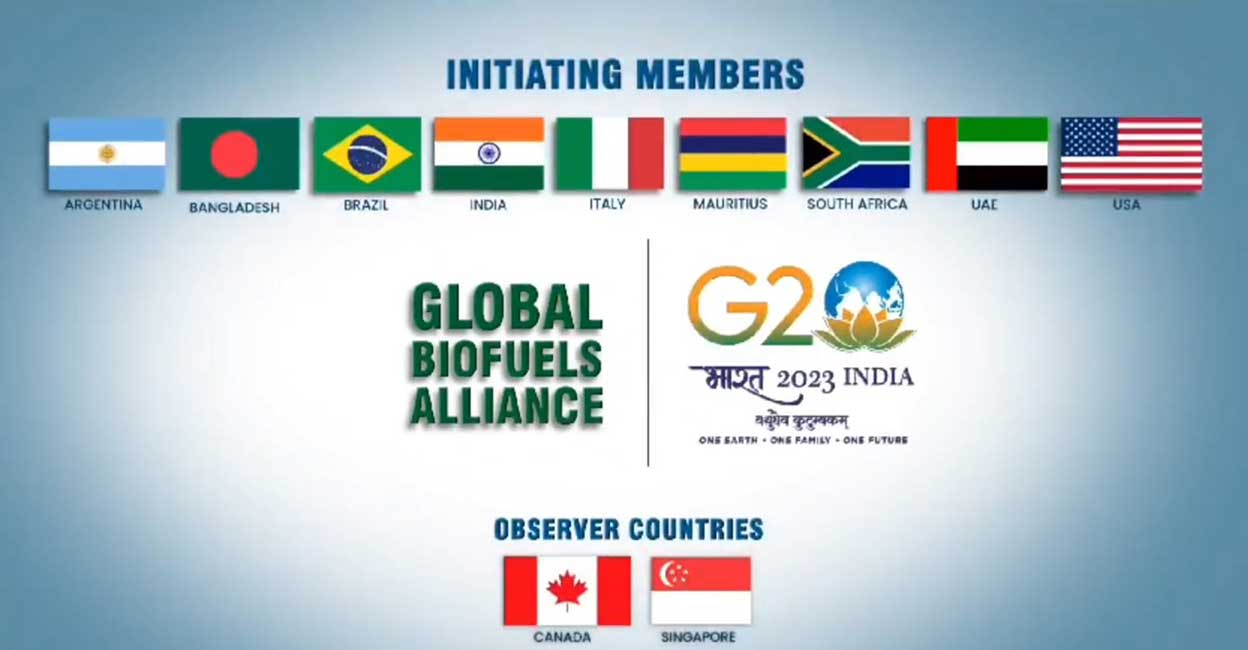On September 10, on the sidelines of the annual G-20 summit in New Delhi, an India-led grouping came together to give impetus to the production and use of biofuels, an alternative to fossil fuels like petroleum and diesel. The grouping, called the Global Biofuels Alliance (GBA) would attempt to bring countries together to co-develop, accelerate technological advances in production processes, and advocate for the use of biofuels particularly in the transport sector. The initiative is aimed at developing an alliance of governments, international organizations, and industry to facilitate the adoption of biofuels.
This partnership was first proposed by India in February of this year during the India Energy Week. The GBA is a programme designed to encourage and ease the use of biofuels. Its objective is to unite international organisations, businesses, and governments to advance the creation and use of biofuels as a pivotal component of the current and coming energy transition.
PM Modi said energy transition is a significant need for the 21st century world considering the challenge of climate change. He said trillions of dollars are required for an inclusive energy transition and that developed countries play a very crucial role in this.

The three founding members, India, U.S.A and Brazil, were joined by a total of 19 countries and 12 international organizations have so far who agreed to join the alliance, including both G20 members and non-member countries. The three founding members of alliance contribute about 85% of the global production and the 81% of consumption of ethanol.
The UAE joined the alliance as the first Gulf nation, demonstrating its intention to diversify its energy sources and lessen its carbon footprint. This is particularly crucial as the nation gets ready to host COP28 later this year.
Apart from India, Brazil and the US, the other G20 member countries supporting the initiative are Argentina, Canada, Italy, and South Africa. Bangladesh, Singapore, Mauritius, and the UAE are the G20 invitee countries succouring the ambitions of the founding members to create and establish a better alternative for clean energy and sustainable fuel industry.
The non-G20 countries interested in joining the alliance are Iceland, Kenya, Guyana, Paraguay, Seychelles, Sri Lanka, Uganda and Finland. Further, World Bank (WB), Asian Development Bank (ADB), World Economic Forum (WEF), World LPG Organization, UN Energy for All, United Nations Industrial Development Organization (UNIDO), Bio futures Platform, International Civil Aviation Organization (ICAO), International Energy Agency (IEA), International Energy Forum (IEF), International Renewable Energy Agency, World Biogas Association are the interested international and multilateral organizations.
WHAT ARE BIOFUELS AND THEIR SIGNIFICANCE
Biofuel is a renewable source of energy which is derived from biomass. India, which imports over 85 per cent of its crude oil needs, is gradually building capacity to produce fuel from such items as crop stubble, plant waste, and municipal solid waste. While India is on schedule to double the mixing of ethanol extracted from sugarcane and agriculture waste to 20 per cent with petrol by 2025, it is also setting up dozens of compressed biogas plants.
To support World’s Energy System towards Net Zero Target, to solve the energy quadrilemma, to strengthen circular economy and provide most effective and environmentally favorable alternative, Global Sustainable Biofuels production needs to triple by 2030 to put the world’s energy systems on track toward net zero emissions by 2050.

Therefore, joint action through the Global Biofuels Alliance with multi-stakeholder support spanning 19 countries and 12 international organizations will identify and address the challenges inhibiting biofuel adoption and production, development and adoption of internationally recognized standards and sustainability requirements. This shall help in reduction in global transportation emissions, increase access to clean cooking fuel, increase farmer’s income, and expand biofuels adoption; which in turn will lead to facilitate cooperation, on a voluntary basis, in intensifying the use of sustainable biofuels through strengthening collaboration between producers, consumers and interested countries, bolstering biofuels markets, and encouraging the development of standards in the sector.
We find that these countries have expanded biofuel production and use by designing long-term strategies, implementing the right investment signals, supporting innovation, ensuring supplies are secure and affordable, addressing sustainability concerns early and collaborating with the international community.
Further, there are three priority areas that would facilitate sustainable biofuel deployment in support of the global energy transition:

INDIA AS THE CENTRE OF BIOFUELS ENERGY TRANSFORMATION

Energy security is crucial from an Indian standpoint. India is the third-largest consumer of crude oil and primarily relies on imported energy, which supplies more than 85% of its energy requirements. To potentially leverage its vast biomass resources and position as an agricultural powerhouse, biofuels have become a significant strategic instrument for India. Both bioethanol and biodiesel are anticipated to expand at a CAGR of 5%, even though they are still a relatively new source of energy in the Indian market.
India has made tremendous strides towards ensuring that renewable energy sources are integrated into its wider energy portfolio, which is in line with the country’s bigger net-zero aspirations. In India, renewable energy has increased at a CAGR of about 22% during the last six years. India’s energy transformation has been and will continue to be centered on biofuels as it tries to meet its net-zero goal by 2070 and aspires to generate 50% of its electricity from renewable sources.
REACTIONS TO THE ALLIANCE FROM OTHER COUNTRIES AND ORGANISATIONS
China and oil producing countries Saudi Arabia and Russia have not yet decided to not be a party to the alliance. With an eye on the Organization of the Petroleum Exporting Countries (OPEC)- Plus grouping– where both Saudi Arabia and Russia are members– the Indian- conceptualized alliance is being deposited as a global forum to help boost demand and technology transfer (ToT) for the product of biofuels and enhance trade globally. India is also looking at adding its biofuel product through varied sources in a shot to cut its import dependence for energy at a time when the OPEC+ grouping has executed consecutive product cuts.
The International Energy Agency (IEA) predicts that biofuels will be crucial in helping to decarbonize the transportation industry. The IEA estimates that in 2022, the demand for biofuels will reach a record high of 4.3 EJ (Exa Joule- Energy unit). This, however, falls short of the net-zero emission goals for 2050. To meet these net-zero requirements by 2023, production must increase by more than 10 EJ which means biofuel consumption must increase by 11% annually. IEA estimates that global sustainable biofuel production would need to triple by 2030 to put the world’s energy system on track towards net-zero emissions by 2050. Liquid biofuels provided more than four per cent of the total transport energy supply in 2022.
The Global Biofuels Alliance, which the world’s third biggest oil consumer wants to push during its G-20 presidency, mirrors the International Solar Alliance (ISA) piloted by New Delhi and Paris in 2015 to bring clean and affordable solar energy within the reach of all. ISA aims to mobilise more than $1,000 billion of investment needed by 2030 for the massive harnessing of solar energy.
INDIAN COMPANIES’ REACTION TO THE GBA
Businesses including Indian Oil Corporation, Bharat Petroleum, and GAIL (India) expressed hope that the collaboration would contribute to the development of a more environmentally friendly future. Bharat Petroleum stated on microblogging site X (previously Twitter), that in addition to enhancing India’s current biofuel programs, GBA is also generating revenue for farmers, lowering carbon emissions, boosting energy security, and building a strong Indian ecosystem. In India, numerous businesses are attempting to establish compressed biogas (CBG) plants. In the next five years, 100 CBG plants will be built by Reliance Industries, which recently surpassed other producers of bioenergy in India. These plants would use 5.5 million tons of organic waste and agro-residue.
POTENTIAL OF GLOBAL BIOFUEL ALLIANCE ON ITS MEMBER NATIONS’ MARKETS

For all its members, the alliance has the potential to create enormous economic opportunities. The alliance may provide member nations with prospects worth up to $500 billion over the following three years, according to an IBA research. By itself, biogas has the potential to provide up to $200 billion in opportunities since it is so cost-effective and because the raw materials are so readily available.
Biofuels are a compelling option for both developing and developed nations because they not only contribute to emissions reduction but also improve energy security (by lowering energy imports, especially given the challenges renewable energy sources have about material availability) and support the circular economy.
(Aanchal Khera is a Master’s student at TERI University pursuing Sustainable Development Practice. She is also an Associate at the Y20 India 2023 Team. Views expressed in the article are her own)
(The views expressed are the author's own and do not necessarily reflect the position of the organisation)


